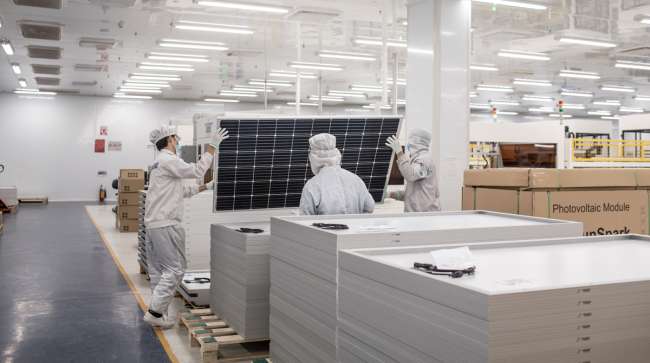US Imposes Duties on Solar Imports From Southeast Asia

[Stay on top of transportation news: Get TTNews in your inbox.]
The U.S. Commerce Department set preliminary duties on solar imports from Southeast Asia, after an initial finding the equipment is benefiting from illegal government aid.
The determination marks an early victory for domestic panel makers who say cheap imports harm their operations and threaten investments meant to cultivate a U.S. solar supply chain. They asked the government to impose the duties, arguing the equipment benefits from unfair foreign subsidies and is being sold at prices below the cost of production.
The targeted nations provide the bulk of U.S. solar cell and module imports. The swift imposition of countervailing duties means renewable developers will face higher prices for that equipment immediately.
The case marks only the latest bid by U.S. manufacturers to confront overseas rivals, beginning with similar duties on solar cells and modules from China about 12 years ago. Chinese manufacturers responded by setting up operations in other Asian nations that weren’t affected by the tariffs.
TT's Seth Clevenger and Erika Voss of DAT Freight and Analytics discuss crucial strategies and best practices for safeguarding information and assets in a high-demand period. Tune in above or by going to RoadSigns.ttnews.com.
The companies pursuing the latest claims as part of the American Alliance for Solar Manufacturing Trade Committee include First Solar Inc., Hanwha Qcells USA Inc. and Mission Solar Energy LLC.
Chinese officials have argued new tariffs threaten to slow the speed of the U.S. energy transition and its fight against climate change. The case has drawn opposition from some foreign manufacturers and domestic renewable power developers, who argue tariffs could give an unfair advantage to larger incumbent U.S. manufacturers while raising the cost of solar power projects.
The investigation is set to continue into next spring — and final rates could be raised, lowered or eliminated altogether based on the results of the probe. Under the Oct. 1 action, preliminary general rates would be 8.25% for Cambodia; 9.13% for Malaysia; 23.06% for Thailand; and 2.85% for Vietnam.
RELATED: US Pushes New Tech Export Rules to Limit China’s Access
The initial rates were lower overall than anticipated. Under the preliminary determination, imports from Hanwha Q Cells Malaysia Sdn. Bhd. face a 14.72% rate.
The Commerce Department is still conducting its initial investigation into claims solar imports from the targeted countries are being dumped in the U.S. and sold below the cost of production. It is expected to reveal a preliminary finding in that case in November.
Want more news? Listen to today's daily briefing below or go here for more info:





